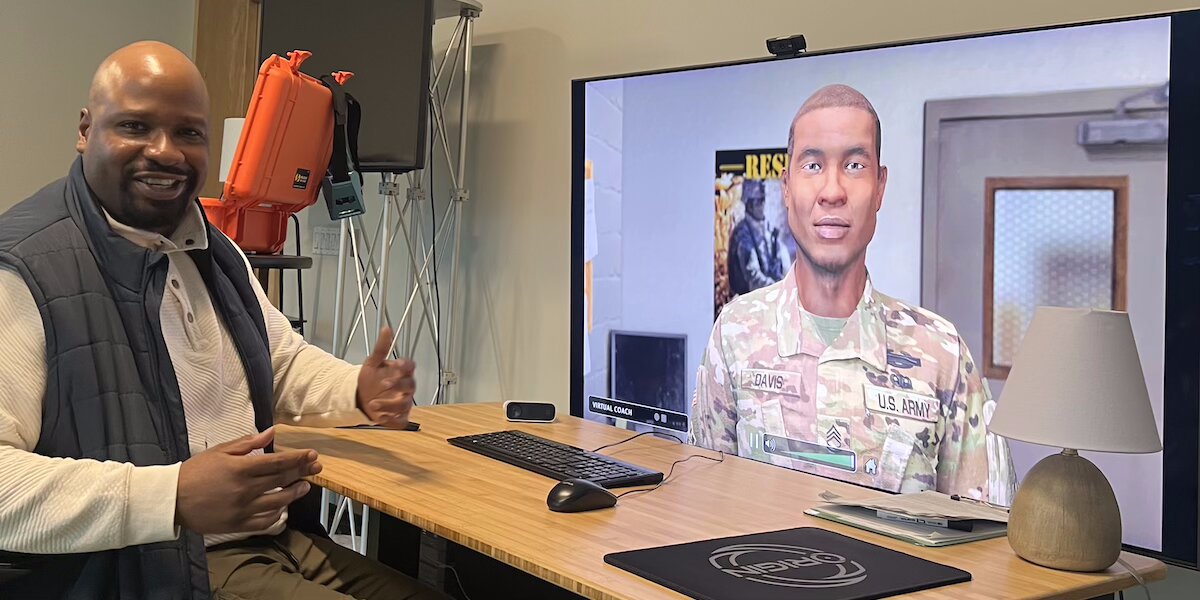
(Photo/Courtesy of David Cobbins)
David Cobbins, a former U.S. Army non-commissioned officer and combat medic, has built a career defined by service, creativity and leadership.
Cobbins, who earned a master’s degree in writing for film and television from the USC School of Cinematic Arts in 2013, now serves as creative producer in the MxR Lab and the project leader for the Emerging Leader Immersive Training Environment (ELITE) at the USC Institute for Creative Technologies (ICT). ELITE is a digital training platform that helps users develop real-world skills through interactive virtual scenarios. The program uses virtual human role-players and real-time data tracking to provide structured, personalized feedback.
“My time in the military, problem-solving and working under pressure and in groups, fed into all the work I do here at ICT,” Cobbins said. “My experience at Warner Bros. and the U.S. Department of Veterans Affairs taught me how to work with data and analysis, which helps me understand various solutions at ICT.”
ICT, a global leader in virtual humans, graphics, AI and mixed reality, is a cutting-edge research institute in the USC Viterbi School of Engineering.
As ELITE project leader, Cobbins keeps the program on track while developing new ideas, concepts and proposals to deliver high-quality products. As a writer, he creates scripts and dialogue for virtual humans that align with specific learning objectives.
“We help the government by researching different ideas and requirements,” Cobbins said. “My goal is to move our projects beyond research and development and into the hands of government personnel, civilians and soldiers who face real-world problems we can help solve.”
The ELITE SHARP training module serves as a leadership and transition tool that helps commanders address issues of sexual assault and harassment in the military. Users interact with a simulated member of an Army unit, played by a virtual actor, who had been involved in a simulated incident of sexual misconduct.
“Our greatest challenge was engaging young people with realistic leadership lessons and helping soldiers come to a resolution about a difficult subject,” Cobbins said.
He added: “We tested commanders before and after using ELITE and saw a significant increase in their knowledge of how to properly respond to sexual assault and harassment. It’s incredible to see ELITE now adopted as a tool across the Army.”
ELITE has four different distribution outlets that train specific skill sets. Users enter an interactive role-playing scenario where their choices, good or bad, shape the narrative and outcome.
“ELITE is flexible because it can teach intervention and response skills for any subject,” Cobbins said. “We now want to upgrade our virtual humans using generative AI techniques to make them photorealistic.”
Cobbins, a writer and creative consultant on game, television, film and military related projects over the last 10 years, is also currently co-lead on both the Digital Interactive Victim Intake System (DIVIS) and Leaders Enhanced & Applied Doctrine System (LEADS) at ICT.
He credits his USC education with teaching him essential skills in his role at ICT, such as managing large projects and coordinating multiple departments.
“Matt Bosack, a showrunner for NCIS Hawaii, was my classmate at USC and initially reached out to me when ICT needed someone with military experience,” Cobbins said. “The Trojan network played a direct role; I don’t think I would have this position without him.”
NOTE: Students interested in getting involved with ICT can visit the website or contact ICT staff members. Many internships take place during the summer, while specific research groups hire interns and student workers throughout the year based on project needs.
ELITE is a digital training platform that leverages ICT research to help users develop real-world skills through interactive virtual scenarios. The program uses virtual human role-players and real-time data tracking to provide structured, personalized feedback.
Published on November 6th, 2025
Last updated on November 6th, 2025







